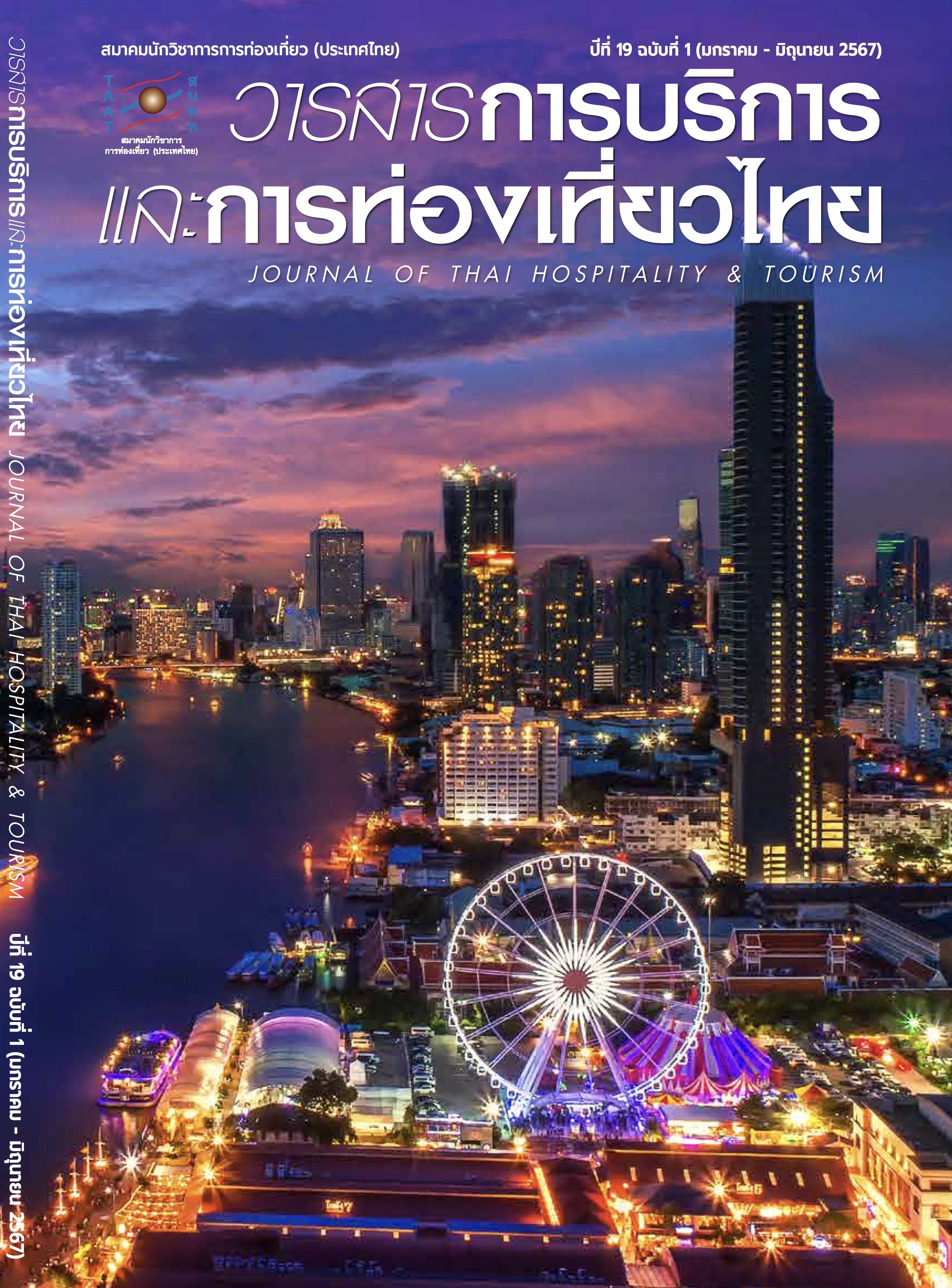โมเดลความสัมพันธ์เชิงสาเหตุส่วนประสมทางการตลาดที่ส่งผลต่อการเดินทางมาท่องเที่ยวของนักท่องเที่ยวชาวจีนในจังหวัดเชียงใหม่
Main Article Content
บทคัดย่อ
การวิจัยครั้งนี้ มีวัตถุประสงค์เพื่อพัฒนาโมเดลความความสัมพันธ์เชิงสาเหตุและตรวจสอบความสอดคล้องของโมเดลกับข้อมูลเชิงประจักษ์ส่วนประสมทางการตลาดที่ส่งผลต่อการเดินทางมาท่องเที่ยวของนักท่องเที่ยวชาวจีนในจังหวัดเชียงใหม่ วิธีดำเนินการวิจัย กลุ่มตัวอย่างคือ นักท่องเที่ยวชาวจีนที่เดินทางมาท่องเที่ยวในจังหวัดเชียงใหม่ จำนวน 240 คน โดยใช้วิธีการสุ่มตัวอย่างแบบเจาะจง วิเคราะห์ข้อมูลโดยการวิเคราะห์แบบจำลองสมการโครงสร้าง
ผลจากการวิจัยพบว่า 1) โมเดลความสัมพันธ์เชิงสาเหตุมีความสอดคล้องกลมกลืนกับข้อมูลเชิงประจักษ์ ค่าไคสแควร์สัมพัทธ์ (CMIN/DF) เท่ากับ 1.528 ซึ่งมีค่าน้อยกว่า 2 ค่าดัชนีวัดระดับความสอดคล้อง (GFI) เท่ากับ 0.911 ซึ่งมีค่ามากกว่า 0.90 และค่า CFI ดัชนีวัดระดับความสอดคล้องเปรียบเทียบ (CFI) เท่ากับ 0.957 ซึ่งมีค่ามากกว่า 0.90 ค่าดัชนีรากของค่าเฉลี่ยกำลังสองของการประมาณค่า ความคาดเคลื่อน (RMSEA) เท่ากับ 0.052 ซึ่งมีค่าน้อยกว่า 0.08 2) โมเดลมีความสอดคล้องกลมกลืนกับข้อมูลเชิงประจักษ์ ของประเด็นการศึกษาในด้านสภาพแวดล้อมทางกายภาพ ราคา ช่องทางการจัดจำหน่าย การส่งเสริมการขาย ผู้ให้บริการ และกระบวนการให้บริการ และผลิตภัณฑ์ส่งผลอิทธิพลทางตรงอย่างมีนัยสำคัญทางสถิติที่ระดับ 0.001 ผลการวิจัยครั้งนี้เป็นประโยชน์ต่อนักวิชาการในด้านการขยายและต่อยอดองค์ความรู้ความสัมพันธ์ของส่วนประสมทางการตลาดในการที่จะสามารถพัฒนาการท่องเที่ยวในการรองรับนักท่องเที่ยวชาวจีนโดยเฉพาะการให้ความสำคัญต่อการพัฒนาผลิตภัณฑ์ที่เป็นส่วนส่งเสริมกระบวนการของส่วนประสมทางการตลาดให้สอดคล้องเป็นโมเดลเพื่อที่จะสามารถนำผลจากการศึกษาไปกำหนดเป็นแผนการรองรับนักท่องเที่ยว
Article Details

อนุญาตภายใต้เงื่อนไข Creative Commons Attribution-NonCommercial-NoDerivatives 4.0 International License.
เอกสารอ้างอิง
Abubakar, A. M., Elrehail, H., Alatailat, M. A. & Elçi, A. (2019). Knowledge Management, Decision-Making Style and Organizational Performance. Journal of Innovation & Knowledge, 4, 104–114.
Aggarwal, S. & Gour, A. (2020). Peeking Inside the Minds of Tourists Using a Novel Web Analytics Approach. Journal of Hospitality and Tourism Management, 45, 580–591.
Aydin, G. (2020). Social Media Engagement and Organic Post Effectiveness: A Roadmap for Increasing the Effectiveness of Social Media Use in Hospitality Industry. Journal of Hospitality Marketing & Management, 29, 1–21.
Chu, S. C., Deng, T. & Cheng, H. (2020). The Role of Social Media Advertising in Hospitality, Tourism and Travel: A Literature Review and Research Agenda. International Journal of Contemporary Hospitality Management, 32, 34193438.
Kitsios, F., Kamariotou, M., Karanikolus, P. & Grigoroudis, E. (2021). Digital Marketing Platforms and Customer Satisfaction: Identifying eWOM Using Big Data and Text Mining. Applied Sciences, 11, 8032.
Obembe, D., Kolade, O., Obembe, F., Owoseni, A. & Mafimisebi, O. (2021). Covid–19 and the Tourism Industry: An Early Stage Sentiment Analysis of the Impact of Social Media and Stakeholder Communication. International Journal of Information Management Data Insights, 1, 100040.
Onder, I., Gunter, U. & Gindl, S. (2020). Utilising Facebook Statistics in Tourism Demand Modelling and Destination Marketing. Journal of Travel Research, 59, 195–208.
Poltanee, I. & Thavornsil, T. (2022). Destination Image of Street Food on China Town an Impact on Tourists’ Dining Experiences. Central Asia and the Causasus, 23, 191–200.
Saheb, T., Amini, B. & Alamdari, F. K. (2021). Quantitative Analysis of the Development of Digital Marketing Field: Bibliometric Analysis and Network Mapping. International Journal of Information Management Data Insights, 1, 100018.
Taecharungroj, V. & Mathayomchan, B. (2019). Analysing TripAdvisor Reviews of Tourist Attractions in Phuket, Thailand. Tourism Management, 75, 550–568.


